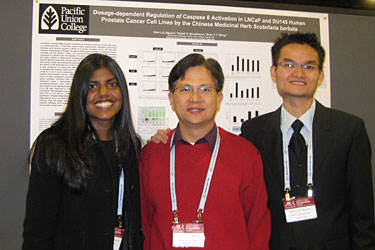Learn More About PUC
Students Continue to Assist with Cancer Research
By David Ranzolin on March 17, 2009
Share this

According to the American Association of Cancer Research, cancer claims the lives of almost 500,000 Americans each year. The cure will come from the research of gifted students, professors and scientists. Leading the charge for Pacific Union College in this field is Dr. Brian Wong, who manages to balance his time between the classroom and the lab. He is joined by senior biochemistry major Rachel Devadhason and senior biology major Tom Nguyen.
Many students don't realize that advanced cancer research is being conducted right here at PUC. It came as a surprise to Devadhason although she was herself a science major. "When I first heard about ongoing cancer research at PUC, I was extremely skeptical," she admitted. "Without state-of-the-art technology and multimillion dollar funding, what could be accomplished? My ignorance kept me from setting foot in the lab for an entire two years."
Devadhason latched on to the research of Wong (who has been studying the effects of Scutellaria barbata and Oldenlandia diffusa on cancer prevention since the early 1990s) early last year and began conducting research of her own. "I was privileged to join Dr. Wong's team of researchers and began to work in earnest," says Devadhason. "I began perusing journals, articles, and papers on cancer biology and herbs with apoptotic properties. Suddenly, analytical chemistry, biochemistry, and biology all came alive as I used techniques from each in our research. The work was tedious and frustrating, but I improved with time." Nguyen has been assisting Wong with his research for some time and presented research with him at a convention in Philadelphia in 2007.
The three presented their research at an American Association of Cancer Research (AACR) convention in Washington D.C. in November. Of the experience, Devadhason recalls, "The conference was like nothing I had ever experienced before. Passionate, brilliant scientists presented cutting-edge research right before my eyes. Advances in prostate cancer, colon cancer, tumor microenvironment, genetic influences, cell signaling, and HPV vaccines were all hot topics. I could not keep up with the M.D.s, Ph.D.s, or post-docs. When it came time to present our own research I was petrified. At one point I was left to fend for myself at the poster and was forced to answer the questions of an apoptosis expert alone. I somehow managed to stumble through the explanations, but resolved that someday, with training and expertise, I would present original work and stand my ground when explaining it."
Devadhason would like to remind students interested in the sciences that there are other career avenues for biology and chemistry degrees outside of the pre-professional realm. Becoming involved in this type of research is an extraordinary opportunity for students to have their work published and be a part of an ongoing project. In the past, other students have also had the opportunity to work with Wong, whose research has been presented at cancer research conventions around the country.
Latest News
Winter Student Week of Worship: Destined to Experience God
By Marina Maher on February 20, 2026
16 Schools Compete in Pioneers Invitational Academy Basketball Tournament
By Ally Romanes on February 5, 2026
Jordan Delarmente: Christ-Centered Service in the Military
By Marina Maher on January 29, 2026
Charlie: The Aviation Program’s New Vessel for Service and Mission
By Marina Maher on January 26, 2026
